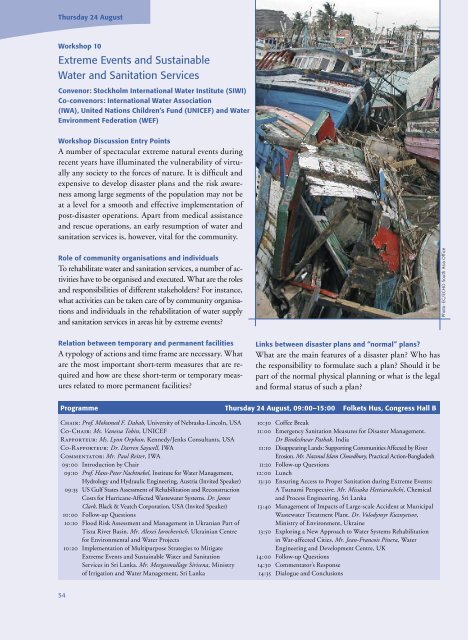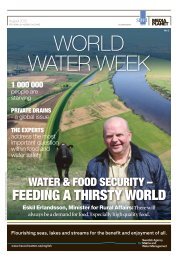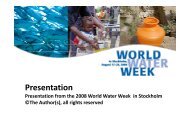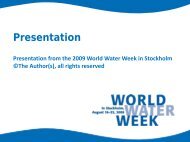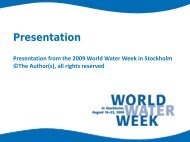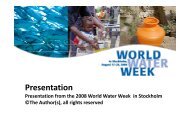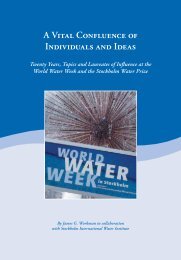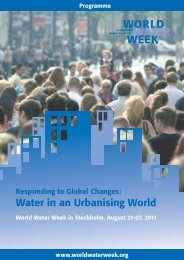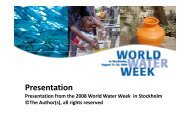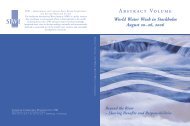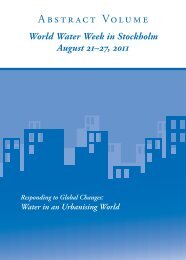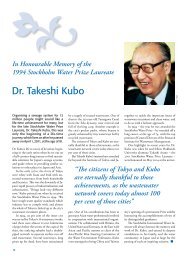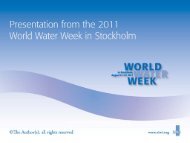Final Programme Beyond the River - World Water Week
Final Programme Beyond the River - World Water Week
Final Programme Beyond the River - World Water Week
You also want an ePaper? Increase the reach of your titles
YUMPU automatically turns print PDFs into web optimized ePapers that Google loves.
Thursday 24 August<br />
Workshop 10<br />
Extreme Events and Sustainable<br />
<strong>Water</strong> and Sanitation Services<br />
Convenor: Stockholm International <strong>Water</strong> Institute (SIWI)<br />
Co-convenors: International <strong>Water</strong> Association<br />
(IWA), United Nations Children’s Fund (UNICEF) and <strong>Water</strong><br />
Environment Federation (WEF)<br />
Workshop Discussion Entry Points<br />
A number of spectacular extreme natural events during<br />
recent years have illuminated <strong>the</strong> vulnerability of virtually<br />
any society to <strong>the</strong> forces of nature. It is difficult and<br />
expensive to develop disaster plans and <strong>the</strong> risk awareness<br />
among large segments of <strong>the</strong> population may not be<br />
at a level for a smooth and effective implementation of<br />
post-disaster operations. Apart from medical assistance<br />
and rescue operations, an early resumption of water and<br />
sanitation services is, however, vital for <strong>the</strong> community.<br />
Role of community organisations and individuals<br />
To rehabilitate water and sanitation services, a number of activities<br />
have to be organised and executed. What are <strong>the</strong> roles<br />
and responsibilities of different stakeholders? For instance,<br />
what activities can be taken care of by community organisations<br />
and individuals in <strong>the</strong> rehabilitation of water supply<br />
and sanitation services in areas hit by extreme events?<br />
Photo: EC/ECHO South Asia Office<br />
Relation between temporary and permanent facilities<br />
A typology of actions and time frame are necessary. What<br />
are <strong>the</strong> most important short-term measures that are required<br />
and how are <strong>the</strong>se short-term or temporary measures<br />
related to more permanent facilities?<br />
Links between disaster plans and “normal” plans?<br />
What are <strong>the</strong> main features of a disaster plan? Who has<br />
<strong>the</strong> responsibility to formulate such a plan? Should it be<br />
part of <strong>the</strong> normal physical planning or what is <strong>the</strong> legal<br />
and formal status of such a plan?<br />
<strong>Programme</strong> Thursday 24 August, 09:00–15:00 Folkets Hus, Congress Hall B<br />
Chair: Prof. Mohamed F. Dahab, University of Nebraska-Lincoln, USA<br />
Co-Chair: Ms. Vanessa Tobin, UNICEF<br />
Rapporteur: Ms. Lynn Orphan, Kennedy/Jenks Consultants, USA<br />
Co-Rapporteur: Dr. Darren Saywell, IWA<br />
Commentator: Mr. Paul Reiter, IWA<br />
09:00 Introduction by Chair<br />
09:10 Prof. Hans-Peter Nachtnebel, Institute for <strong>Water</strong> Management,<br />
Hydrology and Hydraulic Engineering, Austria (Invited Speaker)<br />
09:35 US Gulf States Assessment of Rehabilitation and Reconstruction<br />
Costs for Hurricane-Affected Wastewater Systems. Dr. James<br />
Clark, Black & Veatch Corporation, USA (Invited Speaker)<br />
10:00 Follow-up Questions<br />
10:10 Flood Risk Assessment and Management in Ukranian Part of<br />
Tisza <strong>River</strong> Basin. Mr. Alexei Iarochevitch, Ukrainian Centre<br />
for Environmental and <strong>Water</strong> Projects<br />
10:20 Implementation of Multipurpose Strategies to Mitigate<br />
Extreme Events and Sustainable <strong>Water</strong> and Sanitation<br />
Services in Sri Lanka. Mr. Meegasmullage Sirisena, Ministry<br />
of Irrigation and <strong>Water</strong> Management, Sri Lanka<br />
10:30 Coffee Break<br />
11:00 Emergency Sanitation Measures for Disaster Management.<br />
Dr Bindeshwar Pathak, India<br />
11:10 Disappearing Lands: Supporting Communities Affected by <strong>River</strong><br />
Erosion. Mr. Nazmul Islam Chowdhury, Practical Action-Bangladesh<br />
11:20 Follow-up Questions<br />
12:00 Lunch<br />
13:30 Ensuring Access to Proper Sanitation during Extreme Events:<br />
A Tsunami Perspective. Mr. Missaka Hettiarachchi, Chemical<br />
and Process Engineering, Sri Lanka<br />
13:40 Management of Impacts of Large-scale Accident at Municipal<br />
Wastewater Treatment Plant. Dr. Volodymyr Kuznyetsov,<br />
Ministry of Environment, Ukraine<br />
13:50 Exploring a New Approach to <strong>Water</strong> Systems Rehabilitation<br />
in War-affected Cities. Mr. Jean-Francois Pinera, <strong>Water</strong><br />
Engineering and Development Centre, UK<br />
14:00 Follow-up Questions<br />
14:30 Commentator’s Response<br />
14:35 Dialogue and Conclusions<br />
54


